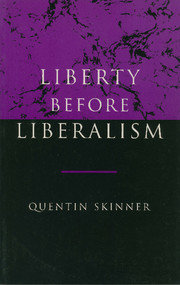3 - Freedom and the historian
Published online by Cambridge University Press: 05 June 2012
Summary
I have been talking about the rise and fall of a particular theory of civil liberty. There is an obvious danger, however, that in speaking as briefly and programmatically as I have been doing I may betray rather than illustrate the principles on which I try to base my practice as an historian. So I ought perhaps to stress that one of the principles I have been trying to illustrate is that intellectual historians will do well to focus not merely or even mainly on a canon of so called classic texts, but rather on the place occupied by such texts in broader traditions and frameworks of thought.
It is worth recalling that this approach contrasts with the orthodoxy prevailing at the time when I began my own post-graduate studies in the early 1960s. A canon of leading texts was widely regarded at that time as the only proper object of research in the history of political thought. The reason, it was urged, is that such texts can by definition be expected to address a set of perennial questions definitive of political thinking itself. It was widely assumed that, if the historical study of moral or political theory is to have any point, this will have to take the form of extracting from the classic texts whatever insights they may be capable of offering us about general questions of society and politics at the present time. They are there to be appropriated and put to work.
- Type
- Chapter
- Information
- Liberty before Liberalism , pp. 101 - 120Publisher: Cambridge University PressPrint publication year: 1997



